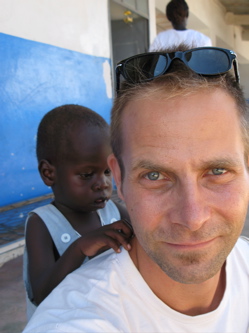
Welcome to the ezine produced by SGI Buddhists that prompts the positive, kindles the constructive, highlights the hopeful and leaves you feeling - well, up!

 ‘I cleaned up the emergency room,
the nursing room, watched the family close the baby’s mouth with gauze. I saw
some outpatients. I took a seed out of a little girl’s nose. I walked back to
the compound alone. I went to the kitchen for a glass of water. Andrea, the
nurse, came in to see me.
‘I cleaned up the emergency room,
the nursing room, watched the family close the baby’s mouth with gauze. I saw
some outpatients. I took a seed out of a little girl’s nose. I walked back to
the compound alone. I went to the kitchen for a glass of water. Andrea, the
nurse, came in to see me.
“Is everything ok at the hospital? Is the baby ok?”
“Ummm… no… she’s dead.”
“Are you ok?”
“Yep, I’m good.”
“You know, you don’t have to keep everything right here,” she said, and pointed to her sternum.
“I know,” I said.
So writes Dr James Maskalyk, a
young Canadian doctor working for Medecins Sans Frontieres, in his blog from a war-torn village in Sudan.
Abyei, a town of about 60,000, lay in the disputed border area between north and south Sudan, caught up in a war that has raged for more than 20 years killing more than two million people and displacing five million more.
Maskalyk, whose previous experience had been as an emergency physician in a downtown Toronto hospital, found himself treating malnourished children, coping with a measles epidemic and struggling to meet overwhelming needs with too few resources as tribal factions waged war around him.
As he struggles to run his makeshift hospital, he offers rare insight into the inner lives of doctors, nurses and volunteers working on the medical front line, especially the courage it takes to keep on going when resolve falters.
‘Some of the work in repairing the world is grim, but most of it is not. Hope not only meets despair in equal measure, it drowns it,’ he says.

